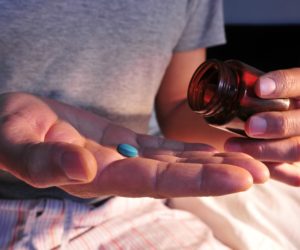Sleeping Pill Addiction and Abuse

Searching for sleeping pills addiction treatment? Help is out there.
Lots of people experience a restless night of sleep once in awhile, but there are some people who have chronic insomnia. These people often find relief in taking sleeping pills to get a good night’s sleep. What many people do not realize is that most sleeping pills are sedative hypnotics, and taking them on a regular basis can be dangerous to their health. Sleeping pill addiction and abuse is widespread in the U.S. and approximately 1/3 to 1/2 of Americans suffer with insomnia.
Sedative hypnotic sleeping pills include specific classes of drugs that are designed to initiate, sustain and prolong sleep for a specific amount of time. These drugs include:
- Benzodiazepines – Some prescription benzodiazepines used as sleep aids and/or to treat anxiety, include Librium, Valium, Xanax and Ativan. These psychoactive depressant drugs are designed to be used on a short-term basis and can cause addiction and problems with memory and concentration. Sleeping pill addiction occurs most often when benzodiazepines are taken long-term or their dosage is abused.
- Miscellaneous – These drugs include anxiolytics, hypnotics and sedatives that depress the central nervous system to induce sleep and reduce anxiety. Some of these drugs include Melatonin, Intermezzo, Xyrem, Benadryl, Ambien, Lunesta, Atarax and many more.
- Barbiturates – Barbiturates depress the central nervous system and induce sedation. They are most often used for anesthetic purposes, and there is a fine line between a safe and unsafe dosage. An overdose of barbiturates may cause death and that is why their use is limited.
Sleeping pills are readily prescribed by doctors to treat insomnia, sometimes without warning the patients of the dangers of sleeping pill addiction and abuse. Many patients believe that the pills are safe and will increase their dosage if the first pill did not put them to sleep. Often, it is when a patient stops taking their sleeping pills that they realize they are addicted to the drug. Some of the signs that may indicate that sleeping pill addiction or abuse has occurred are:
- Experiencing cravings for the drug when it is not taken
- Not being able to stop using the drug
- Experiencing memory loss
- Using sleeping pills regardless of the negative consequences
- Doctor shopping to receive more than one prescription for the drug
- Feeling dizzy or lightheaded
- Having dreamless sleep
- Experiencing a lack of coordination
- Daytime drowsiness
- Changes in appetite
- Poor concentration
- Sleep walking
- Blurred vision
- Urinary retention and constipation
- Headaches
- Restricted breathing
- Nausea and vomiting
- Depression and suicidal thoughts and acts
Older adults are at a greater risk to experience some of the adverse effects of sleeping pills. Some of these effects specific to seniors include:
- Having a fall or fracture
- Becoming confused
- Experiencing memory loss
- Having serious accidents
Sleeping pill addiction and abuse can cause a host of problems for people who take them as a sleep aid. Tolerance can occur and the individual will have to take more pills, or take a pill more often, to achieve the same effects as before. This may lead to depression or an overdose resulting in death. It is not uncommon for sleeping pill addiction and abuse to result in suicide or overdose death. Sedatives are powerful drugs that may adversely affect a person’s physical and mental health. Sleeping pill addiction treatment should be administered at a drug rehab center. The patient will be kept safe and stable while he is slowly weaned off of the sleeping pills. Some of the sleeping pill withdrawal symptoms can include:
- Sweating
- Anxiety
- Insomnia rebound
- Seizures
- Agitation
- Hallucinations
- Confusion
- Tremors
- Changes in blood pressure, heart and respiratory rate
Sleeping pill addiction treatment may also include psychological counseling and therapy. The patient may also be taught effective techniques to enhance sleep without the use of sleeping pills. Relaxation techniques may be used to prepare for nighttime sleep and if the patient wakes up during the night. If you are experiencing sleeping pill addiction and abuse, you should contact a drug rehab center and begin receiving sleeping pill addiction treatment right away.
If you or a loved one needs help with abuse and/or treatment, please call the WhiteSands Treatment at (877) 855-3470. Our addiction specialists can assess your recovery needs and help you get the addiction treatment that provides the best chance for your long-term recovery.
